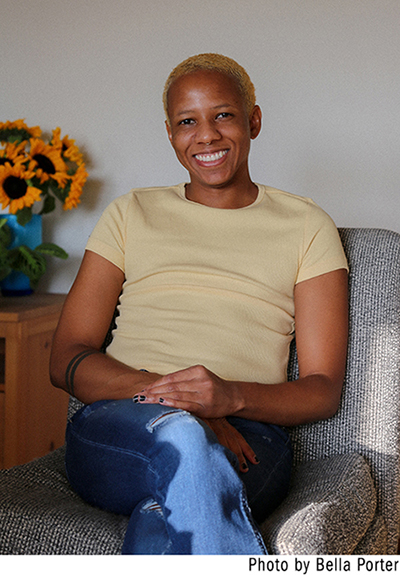Q&A: Kacen Callender on Self-Love, the Pandemic, and 'Lark & Kasim Start a Revolution'
National Book Award–winning author Kacen Callender speaks with SLJ about their new contemporary YA novel Lark & Kasim Start a Revolution (Abrams/Amulet), out September 27.
National Book Award–winning author Kacen Callender speaks with SLJ about their new contemporary YA novel Lark & Kasim Start a Revolution (Abrams/Amulet), out September 27.
 Lark & Kasim Start a Revolution is out later this month. Can you tell us a bit about the plot and the characters?
Lark & Kasim Start a Revolution is out later this month. Can you tell us a bit about the plot and the characters?
Yes, Lark is a 17-year-old nonbinary teen who aspires to be a published author and believes that the only way to achieve that goal is to have over 50K followers on Twitter. (No agent could possibly say no then, right?). But when their former best friend and now number-one enemy Kasim accidentally posts on Lark’s Twitter account declaring his unrequited love in a mega-viral thread, Lark is swept into a lie that’s hard to keep up.
And, one of my favorite tropes is the character who is oblivious to someone else’s pining love—so from the get-go, Lark doesn’t realize that Kasim posted the thread about them, so it’s fun to see Lark make the realization and sort out their own feelings.
What was your inspiration for the book?
I was first inspired by response to Felix Ever After. There was so much love for Felix, which I’m very grateful for, but I also noticed that Felix received a lot of harsh treatment as a teen who makes mistakes. I noticed that there was a double standard in this, with beloved white characters who make mistakes and don’t receive the same judgment. I realized that the more marginalized a character is, the less space they have to make mistakes in their story, though this is a major part of a novel’s craft—that a character must make mistakes so that they can learn and grow, developing the character’s arc.
This double standard reminded me of my own life and the parallels I’ve seen as a marginalized person. To stay safe from that judgement, I became a perfectionist and a people pleaser, and it’s only been in recent years that I’ve been able to begin healing. So, I was inspired to create Lark: a character who is afraid to be unlikeable, but grows to become the sort of person who can make mistakes and know that they are still worthy of love.
The novel is very current, with themes exploring social isolation, the pandemic, and the connections people seek online. What drew you to these topics?
I wrote the first draft of this book in 2020, around the time of quarantine. My only social outlet at the time was social media, so all three topics influenced a lot while drafting the book. I also knew that the book couldn’t be a contemporary story without exploring the pandemic, and I didn’t want to try to brush it under the rug—and especially for a YA, social media is a large part of connection today, too. I was drawn to the topics because I wanted the book to feel realistic as a contemporary.
 What was the writing process like? Were there aspects that were easier or more challenging than you anticipated?
What was the writing process like? Were there aspects that were easier or more challenging than you anticipated?
Originally, the book was set during the year 2020—within the first chapter, a news station would announce a mysterious new illness. This time line was very challenging—even though I was still living it at the time, I did a lot of research every day that’d passed, and it began to feel like the book was more about the year 2020 than it was about Lark. The original draft became more of an outline as I went back to the story, and changed it to a time line that was vaguer and not exactly in the year 2020, allowing for more freedom.
Lark’s journey to self-love and truth is so powerful. Can you talk about the importance of that?
I think that something that’s commonly said is that the pandemic forced a pause that allowed many people to reflect on their lives, their traumas and wounds, and their healing—that’s certainly been true for me, anyway. Self-love and finding authenticity outside of people pleasing has felt buried in a fast-paced, work-work-work world, and in my experience, there was never as much focus on finding connection and love with self. People are generally trained to seek approval and permission to love themselves from others at a young age—to seek validation in order to feel worthy, especially if we’re marginalized, since it can be a matter of safety. I think so many of us have been in survival mode for so long that healing, and being in touch with the body and what really brings us joy, wasn’t even fully on our radars. It definitely wasn’t on mine, and I think that I would have loved and needed a book like Lark & Kasim when I was a teenager—to at least seed in ideas of finding self-love, to stop people pleasing, and to find my authenticity sooner.
What do you hope readers will take away from the book?
I hope readers will take away that we are all learning and growing human beings who will make mistakes and are still worthy of respect and love.
RELATED
The job outlook in 2030: Librarians will be in demand
The job outlook in 2030: Librarians will be in demand
ALREADY A SUBSCRIBER? LOG IN
We are currently offering this content for free. Sign up now to activate your personal profile, where you can save articles for future viewing





Add Comment :-
Be the first reader to comment.
Comment Policy:
Comment should not be empty !!!